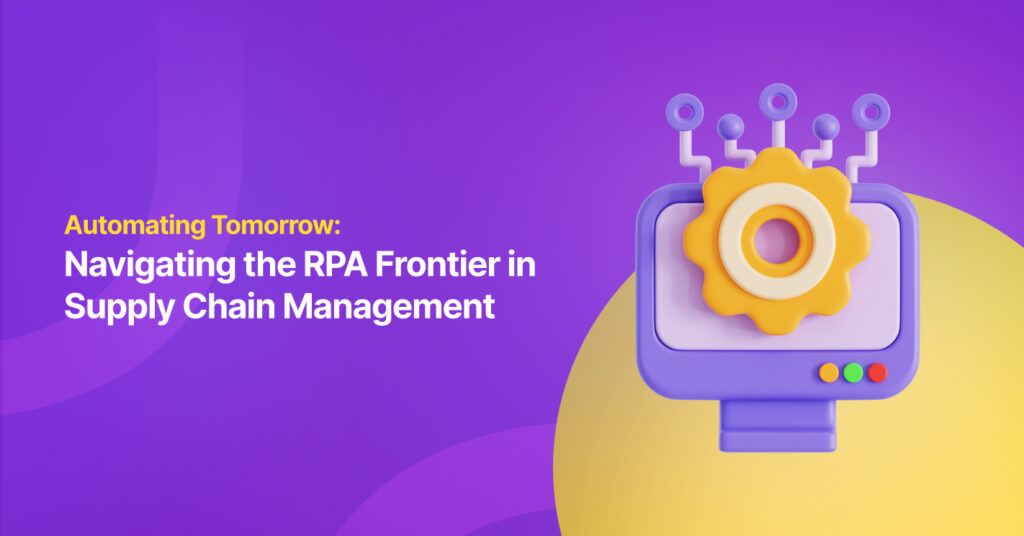Embarking on a journey towards the future of supply chain management, an eye-opening prediction from Gartner sets the stage: By 2026, an astounding 75 percent of large enterprises will embrace the era of intralogistics smart robots within their warehouses. These physical robots represent cutting-edge systems strategically deployed in distribution centers, heralding a new frontier in supply chain management.
While intralogistics smart robots are making waves in the physical realm, there’s another transformative force reshaping the landscape in the digital domain—Robotic Process Automation (RPA). Unlike their physical counterparts, RPA operates entirely in the digital sphere, revolutionizing supply chains through automated business processes. This article explores the pivotal role of RPA in this revolution, elucidating how this fully digital technology can drive unparalleled improvements in productivity, accuracy, and overall operational excellence.
The Evolution of Supply Chain Management
Supply chain management is the backbone of any successful business, ensuring the seamless flow of goods and services from manufacturers to end consumers. Traditionally, supply chain processes have been labor-intensive, prone to errors, and often characterized by inefficiencies. However, the advent of RPA has ushered in a new era of automation, offering a myriad of benefits to organizations across diverse industries.
Understanding Robotic Process Automation (RPA)
At its core, RPA is a technology that utilizes software robots or “bots” to automate repetitive, rule-based tasks previously carried out by humans. These bots can mimic human interactions with digital systems, navigate through various applications, and execute tasks with speed and precision. In the context of supply chain management, RPA holds the potential to transform mundane, time-consuming processes into efficient, error-free operations.
Streamlining Inventory Management
One of the key areas where RPA can make a substantial impact is inventory management. Traditional methods of inventory tracking and management are often manual, leading to discrepancies, stockouts, and overstock situations. RPA can automate inventory-related tasks, such as updating stock levels, generating purchase orders, and reconciling discrepancies. This not only ensures real-time visibility into inventory but also reduces the likelihood of errors, ultimately enhancing overall supply chain efficiency.
Accelerating Order Processing
Efficient order processing is critical for meeting customer demands and maintaining a competitive edge. RPA can significantly accelerate order processing by automating order entry, validation, and invoicing. This results in faster order fulfillment, reduced order processing times, and improved customer satisfaction. With RPA handling routine tasks, human resources can be redirected towards more strategic and value-added activities within the supply chain.
Enhancing Data Accuracy and Compliance
Supply chain operations involve managing vast amounts of data, and inaccuracies can have far-reaching consequences. RPA ensures data accuracy by eliminating the risk of manual errors in data entry, reconciliation, and reporting. Moreover, RPA can play a crucial role in ensuring regulatory compliance by consistently following predefined rules and protocols, reducing the risk of non-compliance and associated penalties.
Improving Communication and Collaboration
Effective communication and collaboration among supply chain stakeholders are paramount for success. RPA facilitates seamless integration between disparate systems, enabling real-time data exchange and communication. This ensures that all stakeholders, from suppliers to distributors, have access to accurate and up-to-date information. The result is a more responsive and collaborative supply chain ecosystem
Scalability and Adaptability
The dynamic nature of supply chain management demands a technology that can adapt to changing business requirements. RPA offers scalability, allowing organizations to scale automation efforts up or down based on evolving needs. Whether handling a sudden increase in order volumes or adapting to changes in regulatory requirements, RPA provides the flexibility needed to keep supply chain processes agile and responsive.
Cost Savings and Return on Investment (ROI)
Implementing RPA in supply chain management not only improves operational efficiency but also contributes to significant cost savings. By automating repetitive tasks, organizations can reduce labor costs, minimize errors, and optimize resource utilization. The return on investment (ROI) from RPA implementation in the supply chain is often rapid, making it a compelling choice for businesses looking to enhance their bottom line.
Conclusion
As businesses navigate the complexities of today’s global supply chains, the role of Robotic Process Automation (RPA) becomes increasingly pivotal. By automating mundane tasks, streamlining processes, and enhancing overall efficiency, RPA emerges as a catalyst for transformation in supply chain management. Organizations that embrace this technology are poised to gain a competitive advantage, driving innovation and achieving new heights of operational excellence in the ever-evolving landscape of modern business.
Discover how Mitrais can tailor RPA solutions to meet the unique needs of your business. Don’t miss out on the future of supply chain management and contact us today.






